Sociology Report: European Migration, Trade, and Congo's Mining
VerifiedAdded on 2022/09/06
|20
|5361
|21
Report
AI Summary
This sociology report investigates the multifaceted challenges of migration to Europe, focusing on the interplay of global trade policies, postcolonial interventions, and social issues. The report examines the refugee crisis, particularly the influx of migrants from Asia and Africa, and analyzes the underlying factors such as civil wars, economic instability, and the impact of conflicts in regions like Congo. It explores how global trade policies, particularly in Congo's mining industry, contribute to migration patterns and the resulting social and economic pressures on European countries. The report also delves into the implications of illegal immigration, the role of international organizations, and the complexities of integrating migrants into European societies. The analysis incorporates sociological theories to understand the motivations behind migration and the impact of migration on both sending and receiving countries, offering insights into the complex dynamics of migration and its effects on global trade.
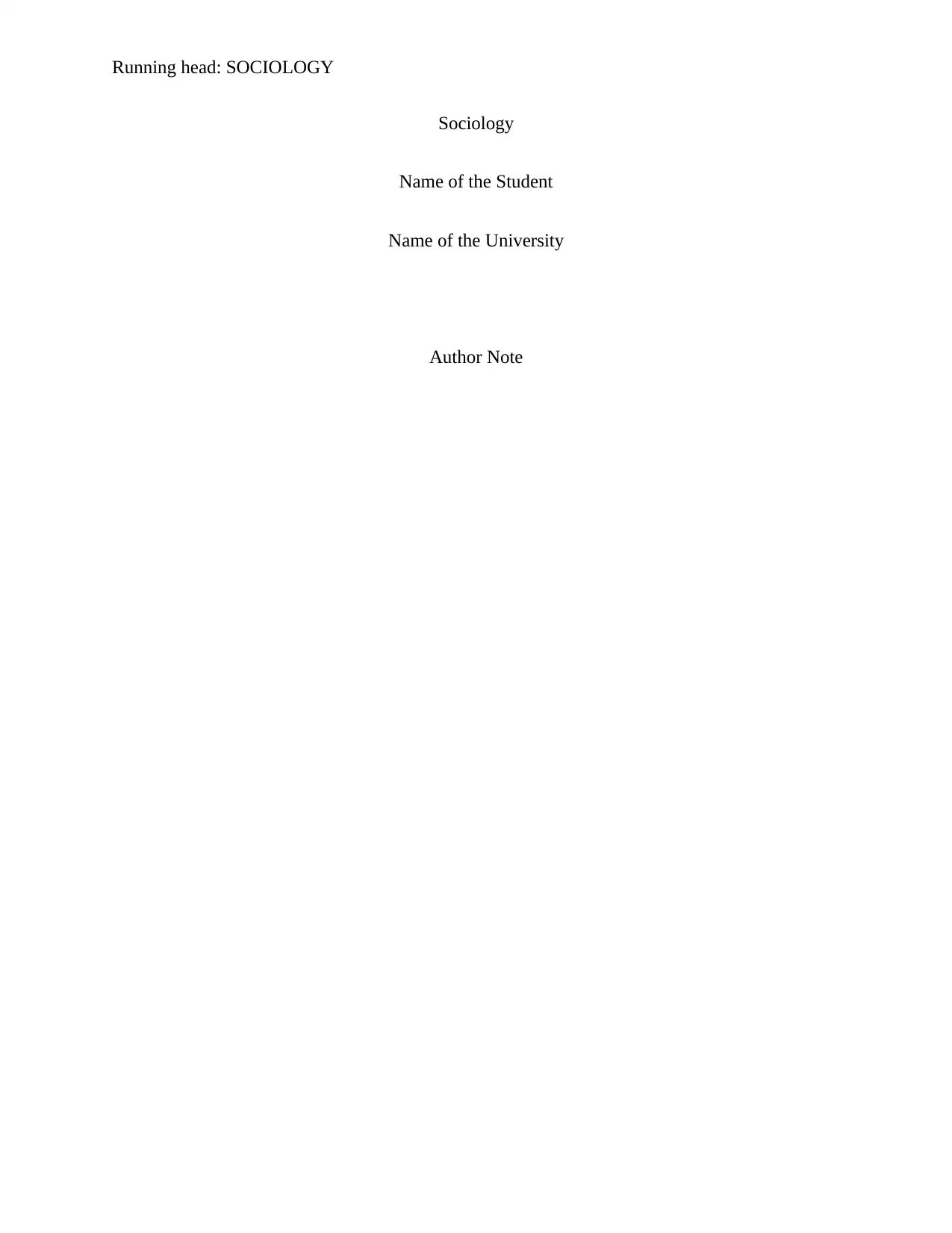
Running head: SOCIOLOGY
Sociology
Name of the Student
Name of the University
Author Note
Sociology
Name of the Student
Name of the University
Author Note
Paraphrase This Document
Need a fresh take? Get an instant paraphrase of this document with our AI Paraphraser
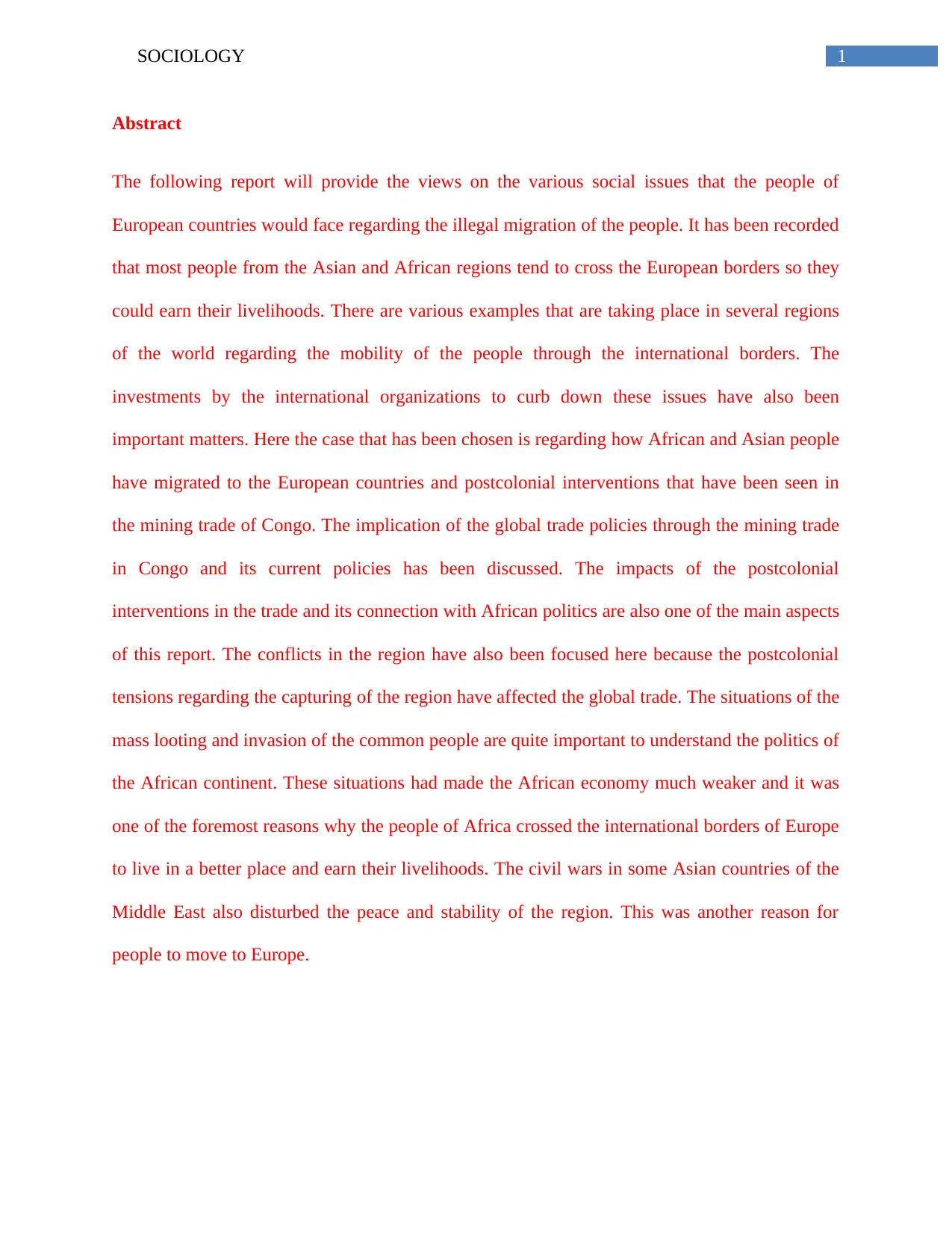
1SOCIOLOGY
Abstract
The following report will provide the views on the various social issues that the people of
European countries would face regarding the illegal migration of the people. It has been recorded
that most people from the Asian and African regions tend to cross the European borders so they
could earn their livelihoods. There are various examples that are taking place in several regions
of the world regarding the mobility of the people through the international borders. The
investments by the international organizations to curb down these issues have also been
important matters. Here the case that has been chosen is regarding how African and Asian people
have migrated to the European countries and postcolonial interventions that have been seen in
the mining trade of Congo. The implication of the global trade policies through the mining trade
in Congo and its current policies has been discussed. The impacts of the postcolonial
interventions in the trade and its connection with African politics are also one of the main aspects
of this report. The conflicts in the region have also been focused here because the postcolonial
tensions regarding the capturing of the region have affected the global trade. The situations of the
mass looting and invasion of the common people are quite important to understand the politics of
the African continent. These situations had made the African economy much weaker and it was
one of the foremost reasons why the people of Africa crossed the international borders of Europe
to live in a better place and earn their livelihoods. The civil wars in some Asian countries of the
Middle East also disturbed the peace and stability of the region. This was another reason for
people to move to Europe.
Abstract
The following report will provide the views on the various social issues that the people of
European countries would face regarding the illegal migration of the people. It has been recorded
that most people from the Asian and African regions tend to cross the European borders so they
could earn their livelihoods. There are various examples that are taking place in several regions
of the world regarding the mobility of the people through the international borders. The
investments by the international organizations to curb down these issues have also been
important matters. Here the case that has been chosen is regarding how African and Asian people
have migrated to the European countries and postcolonial interventions that have been seen in
the mining trade of Congo. The implication of the global trade policies through the mining trade
in Congo and its current policies has been discussed. The impacts of the postcolonial
interventions in the trade and its connection with African politics are also one of the main aspects
of this report. The conflicts in the region have also been focused here because the postcolonial
tensions regarding the capturing of the region have affected the global trade. The situations of the
mass looting and invasion of the common people are quite important to understand the politics of
the African continent. These situations had made the African economy much weaker and it was
one of the foremost reasons why the people of Africa crossed the international borders of Europe
to live in a better place and earn their livelihoods. The civil wars in some Asian countries of the
Middle East also disturbed the peace and stability of the region. This was another reason for
people to move to Europe.
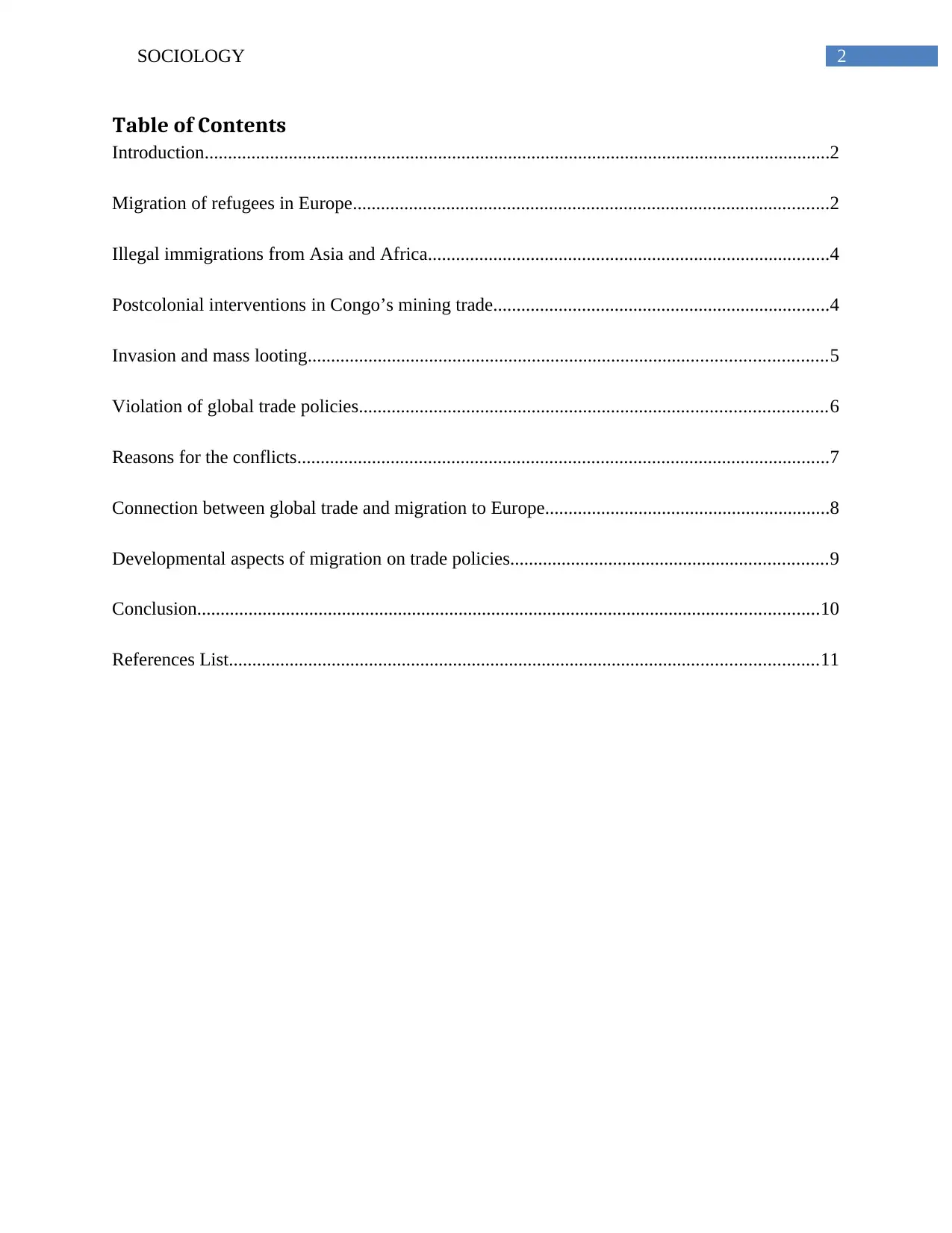
2SOCIOLOGY
Table of Contents
Introduction......................................................................................................................................2
Migration of refugees in Europe......................................................................................................2
Illegal immigrations from Asia and Africa......................................................................................4
Postcolonial interventions in Congo’s mining trade........................................................................4
Invasion and mass looting...............................................................................................................5
Violation of global trade policies....................................................................................................6
Reasons for the conflicts..................................................................................................................7
Connection between global trade and migration to Europe.............................................................8
Developmental aspects of migration on trade policies....................................................................9
Conclusion.....................................................................................................................................10
References List..............................................................................................................................11
Table of Contents
Introduction......................................................................................................................................2
Migration of refugees in Europe......................................................................................................2
Illegal immigrations from Asia and Africa......................................................................................4
Postcolonial interventions in Congo’s mining trade........................................................................4
Invasion and mass looting...............................................................................................................5
Violation of global trade policies....................................................................................................6
Reasons for the conflicts..................................................................................................................7
Connection between global trade and migration to Europe.............................................................8
Developmental aspects of migration on trade policies....................................................................9
Conclusion.....................................................................................................................................10
References List..............................................................................................................................11
⊘ This is a preview!⊘
Do you want full access?
Subscribe today to unlock all pages.

Trusted by 1+ million students worldwide
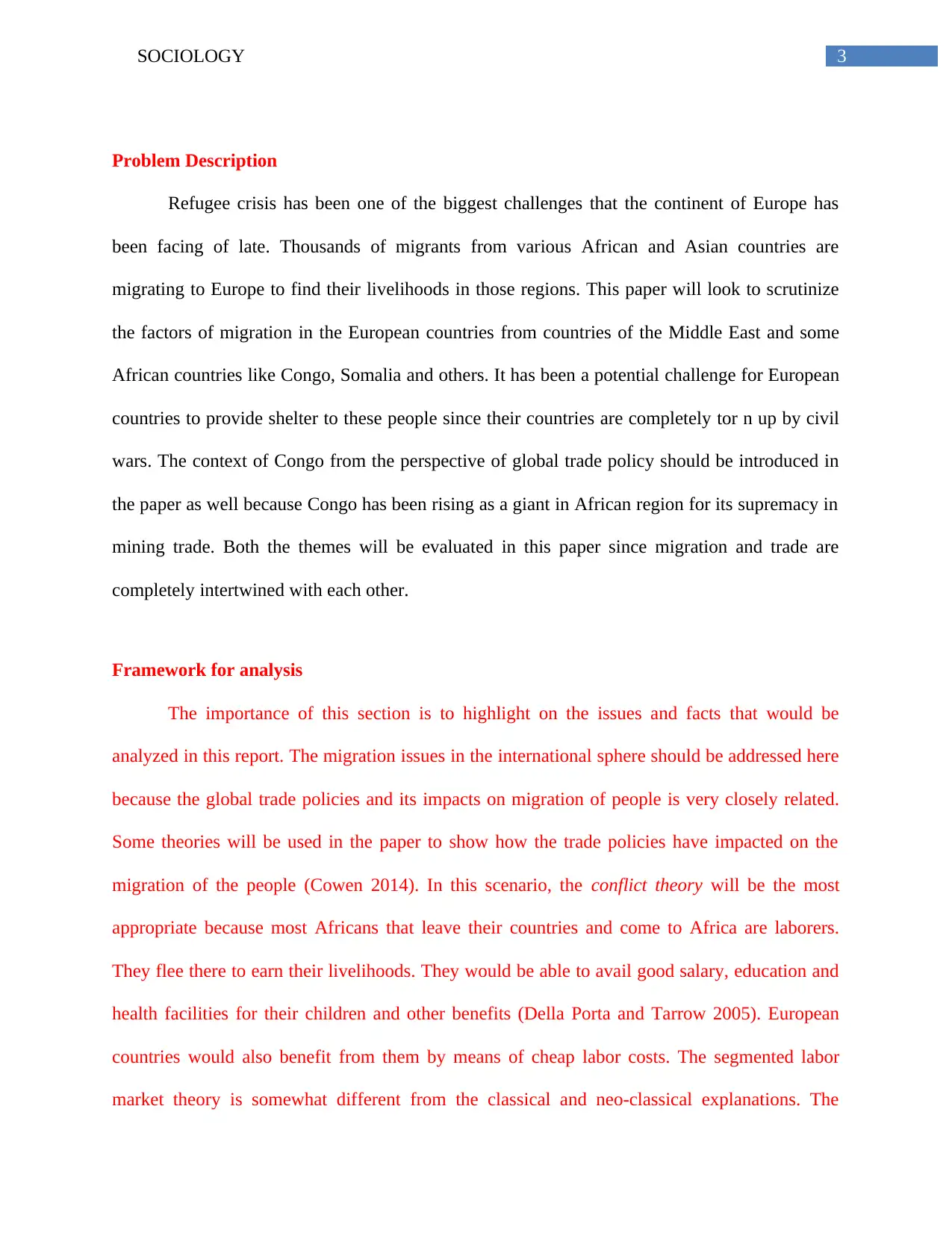
3SOCIOLOGY
Problem Description
Refugee crisis has been one of the biggest challenges that the continent of Europe has
been facing of late. Thousands of migrants from various African and Asian countries are
migrating to Europe to find their livelihoods in those regions. This paper will look to scrutinize
the factors of migration in the European countries from countries of the Middle East and some
African countries like Congo, Somalia and others. It has been a potential challenge for European
countries to provide shelter to these people since their countries are completely tor n up by civil
wars. The context of Congo from the perspective of global trade policy should be introduced in
the paper as well because Congo has been rising as a giant in African region for its supremacy in
mining trade. Both the themes will be evaluated in this paper since migration and trade are
completely intertwined with each other.
Framework for analysis
The importance of this section is to highlight on the issues and facts that would be
analyzed in this report. The migration issues in the international sphere should be addressed here
because the global trade policies and its impacts on migration of people is very closely related.
Some theories will be used in the paper to show how the trade policies have impacted on the
migration of the people (Cowen 2014). In this scenario, the conflict theory will be the most
appropriate because most Africans that leave their countries and come to Africa are laborers.
They flee there to earn their livelihoods. They would be able to avail good salary, education and
health facilities for their children and other benefits (Della Porta and Tarrow 2005). European
countries would also benefit from them by means of cheap labor costs. The segmented labor
market theory is somewhat different from the classical and neo-classical explanations. The
Problem Description
Refugee crisis has been one of the biggest challenges that the continent of Europe has
been facing of late. Thousands of migrants from various African and Asian countries are
migrating to Europe to find their livelihoods in those regions. This paper will look to scrutinize
the factors of migration in the European countries from countries of the Middle East and some
African countries like Congo, Somalia and others. It has been a potential challenge for European
countries to provide shelter to these people since their countries are completely tor n up by civil
wars. The context of Congo from the perspective of global trade policy should be introduced in
the paper as well because Congo has been rising as a giant in African region for its supremacy in
mining trade. Both the themes will be evaluated in this paper since migration and trade are
completely intertwined with each other.
Framework for analysis
The importance of this section is to highlight on the issues and facts that would be
analyzed in this report. The migration issues in the international sphere should be addressed here
because the global trade policies and its impacts on migration of people is very closely related.
Some theories will be used in the paper to show how the trade policies have impacted on the
migration of the people (Cowen 2014). In this scenario, the conflict theory will be the most
appropriate because most Africans that leave their countries and come to Africa are laborers.
They flee there to earn their livelihoods. They would be able to avail good salary, education and
health facilities for their children and other benefits (Della Porta and Tarrow 2005). European
countries would also benefit from them by means of cheap labor costs. The segmented labor
market theory is somewhat different from the classical and neo-classical explanations. The
Paraphrase This Document
Need a fresh take? Get an instant paraphrase of this document with our AI Paraphraser
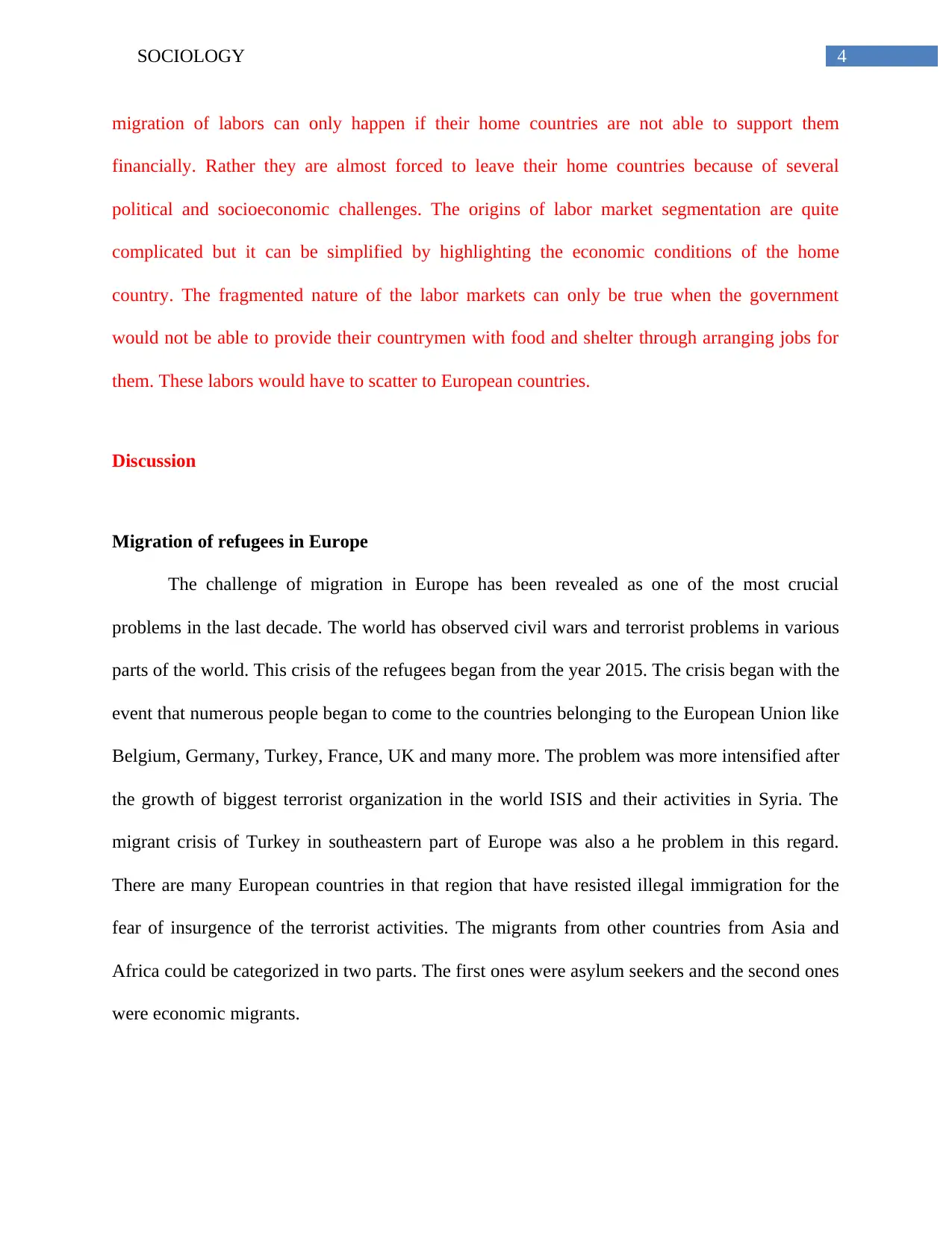
4SOCIOLOGY
migration of labors can only happen if their home countries are not able to support them
financially. Rather they are almost forced to leave their home countries because of several
political and socioeconomic challenges. The origins of labor market segmentation are quite
complicated but it can be simplified by highlighting the economic conditions of the home
country. The fragmented nature of the labor markets can only be true when the government
would not be able to provide their countrymen with food and shelter through arranging jobs for
them. These labors would have to scatter to European countries.
Discussion
Migration of refugees in Europe
The challenge of migration in Europe has been revealed as one of the most crucial
problems in the last decade. The world has observed civil wars and terrorist problems in various
parts of the world. This crisis of the refugees began from the year 2015. The crisis began with the
event that numerous people began to come to the countries belonging to the European Union like
Belgium, Germany, Turkey, France, UK and many more. The problem was more intensified after
the growth of biggest terrorist organization in the world ISIS and their activities in Syria. The
migrant crisis of Turkey in southeastern part of Europe was also a he problem in this regard.
There are many European countries in that region that have resisted illegal immigration for the
fear of insurgence of the terrorist activities. The migrants from other countries from Asia and
Africa could be categorized in two parts. The first ones were asylum seekers and the second ones
were economic migrants.
migration of labors can only happen if their home countries are not able to support them
financially. Rather they are almost forced to leave their home countries because of several
political and socioeconomic challenges. The origins of labor market segmentation are quite
complicated but it can be simplified by highlighting the economic conditions of the home
country. The fragmented nature of the labor markets can only be true when the government
would not be able to provide their countrymen with food and shelter through arranging jobs for
them. These labors would have to scatter to European countries.
Discussion
Migration of refugees in Europe
The challenge of migration in Europe has been revealed as one of the most crucial
problems in the last decade. The world has observed civil wars and terrorist problems in various
parts of the world. This crisis of the refugees began from the year 2015. The crisis began with the
event that numerous people began to come to the countries belonging to the European Union like
Belgium, Germany, Turkey, France, UK and many more. The problem was more intensified after
the growth of biggest terrorist organization in the world ISIS and their activities in Syria. The
migrant crisis of Turkey in southeastern part of Europe was also a he problem in this regard.
There are many European countries in that region that have resisted illegal immigration for the
fear of insurgence of the terrorist activities. The migrants from other countries from Asia and
Africa could be categorized in two parts. The first ones were asylum seekers and the second ones
were economic migrants.
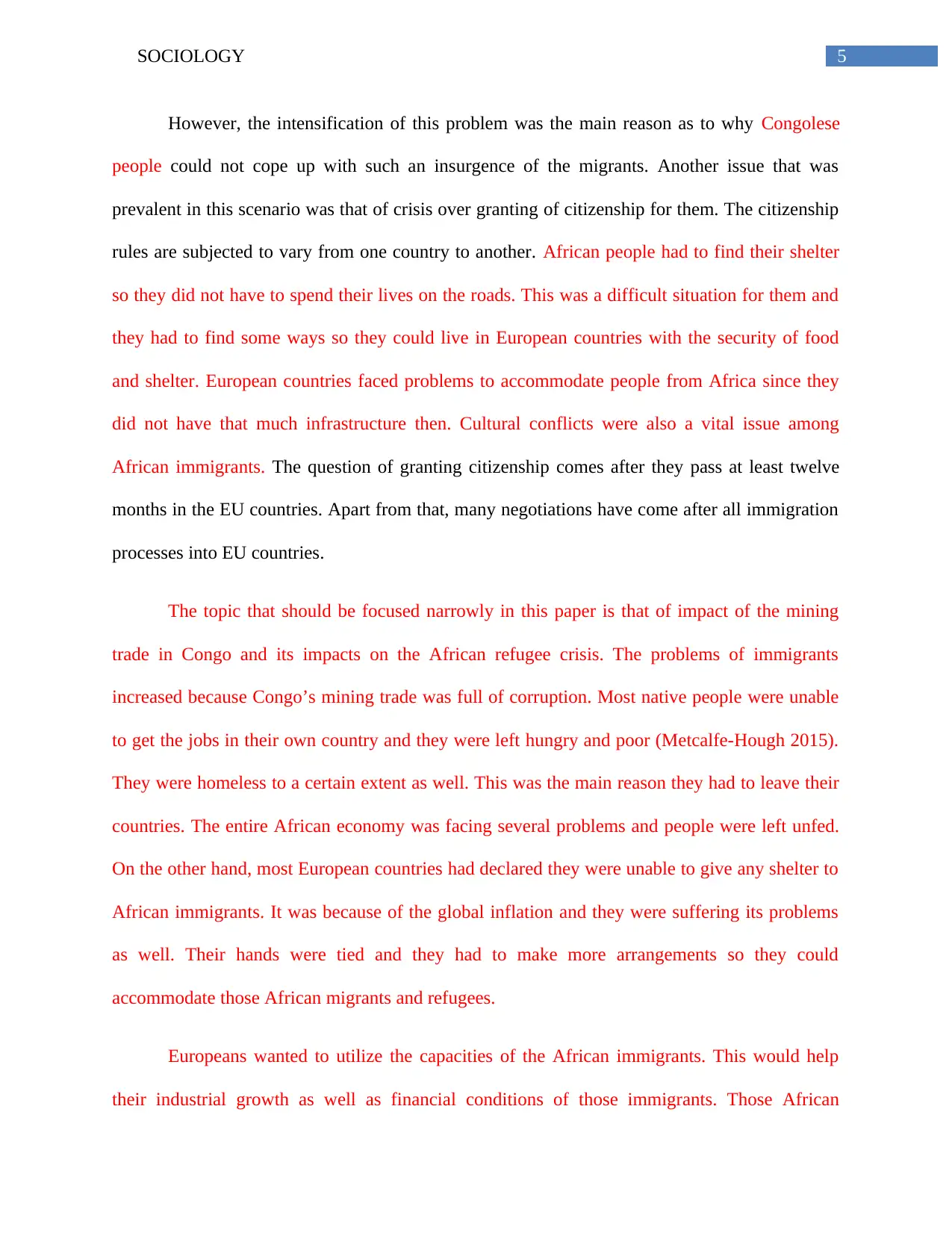
5SOCIOLOGY
However, the intensification of this problem was the main reason as to why Congolese
people could not cope up with such an insurgence of the migrants. Another issue that was
prevalent in this scenario was that of crisis over granting of citizenship for them. The citizenship
rules are subjected to vary from one country to another. African people had to find their shelter
so they did not have to spend their lives on the roads. This was a difficult situation for them and
they had to find some ways so they could live in European countries with the security of food
and shelter. European countries faced problems to accommodate people from Africa since they
did not have that much infrastructure then. Cultural conflicts were also a vital issue among
African immigrants. The question of granting citizenship comes after they pass at least twelve
months in the EU countries. Apart from that, many negotiations have come after all immigration
processes into EU countries.
The topic that should be focused narrowly in this paper is that of impact of the mining
trade in Congo and its impacts on the African refugee crisis. The problems of immigrants
increased because Congo’s mining trade was full of corruption. Most native people were unable
to get the jobs in their own country and they were left hungry and poor (Metcalfe-Hough 2015).
They were homeless to a certain extent as well. This was the main reason they had to leave their
countries. The entire African economy was facing several problems and people were left unfed.
On the other hand, most European countries had declared they were unable to give any shelter to
African immigrants. It was because of the global inflation and they were suffering its problems
as well. Their hands were tied and they had to make more arrangements so they could
accommodate those African migrants and refugees.
Europeans wanted to utilize the capacities of the African immigrants. This would help
their industrial growth as well as financial conditions of those immigrants. Those African
However, the intensification of this problem was the main reason as to why Congolese
people could not cope up with such an insurgence of the migrants. Another issue that was
prevalent in this scenario was that of crisis over granting of citizenship for them. The citizenship
rules are subjected to vary from one country to another. African people had to find their shelter
so they did not have to spend their lives on the roads. This was a difficult situation for them and
they had to find some ways so they could live in European countries with the security of food
and shelter. European countries faced problems to accommodate people from Africa since they
did not have that much infrastructure then. Cultural conflicts were also a vital issue among
African immigrants. The question of granting citizenship comes after they pass at least twelve
months in the EU countries. Apart from that, many negotiations have come after all immigration
processes into EU countries.
The topic that should be focused narrowly in this paper is that of impact of the mining
trade in Congo and its impacts on the African refugee crisis. The problems of immigrants
increased because Congo’s mining trade was full of corruption. Most native people were unable
to get the jobs in their own country and they were left hungry and poor (Metcalfe-Hough 2015).
They were homeless to a certain extent as well. This was the main reason they had to leave their
countries. The entire African economy was facing several problems and people were left unfed.
On the other hand, most European countries had declared they were unable to give any shelter to
African immigrants. It was because of the global inflation and they were suffering its problems
as well. Their hands were tied and they had to make more arrangements so they could
accommodate those African migrants and refugees.
Europeans wanted to utilize the capacities of the African immigrants. This would help
their industrial growth as well as financial conditions of those immigrants. Those African
⊘ This is a preview!⊘
Do you want full access?
Subscribe today to unlock all pages.

Trusted by 1+ million students worldwide
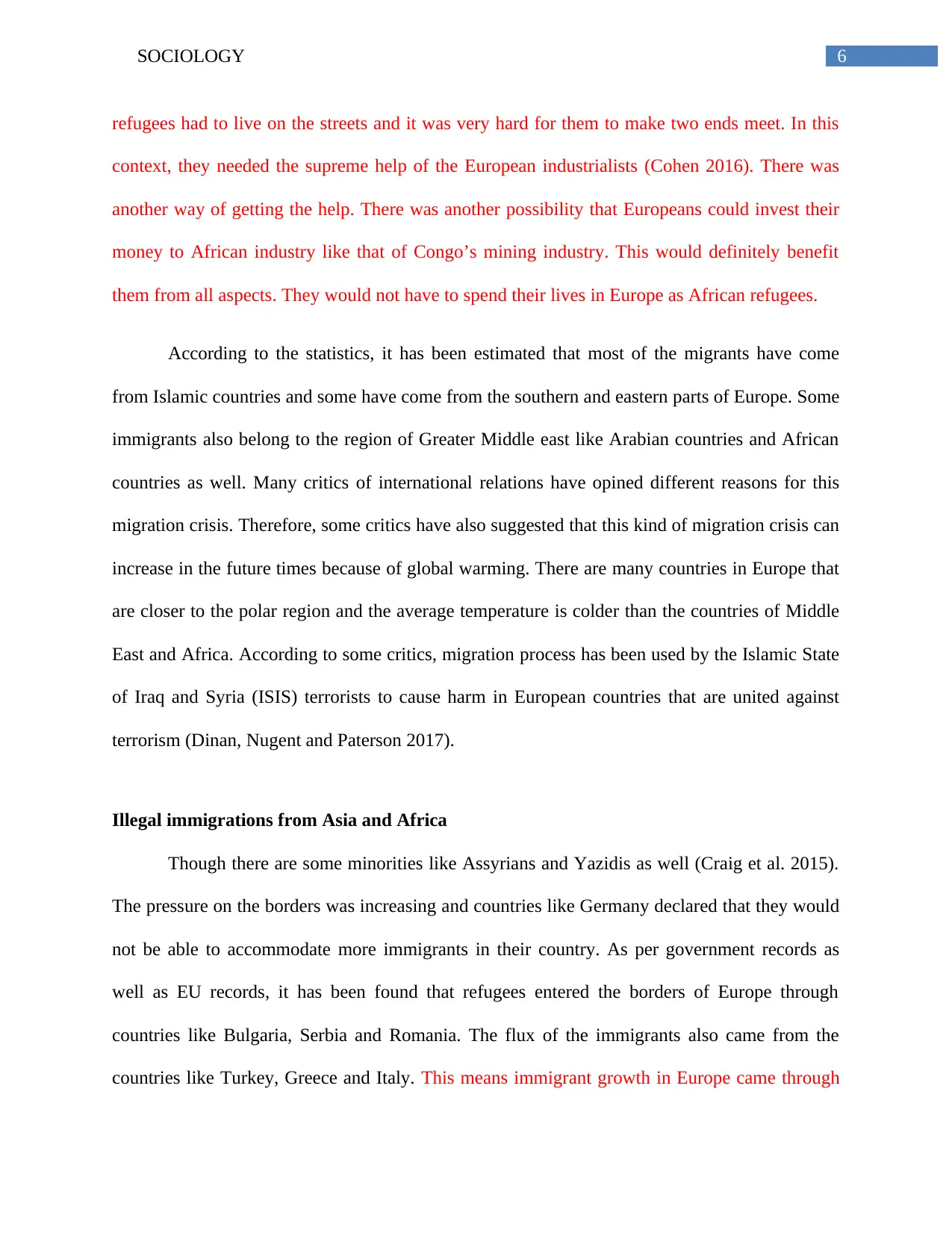
6SOCIOLOGY
refugees had to live on the streets and it was very hard for them to make two ends meet. In this
context, they needed the supreme help of the European industrialists (Cohen 2016). There was
another way of getting the help. There was another possibility that Europeans could invest their
money to African industry like that of Congo’s mining industry. This would definitely benefit
them from all aspects. They would not have to spend their lives in Europe as African refugees.
According to the statistics, it has been estimated that most of the migrants have come
from Islamic countries and some have come from the southern and eastern parts of Europe. Some
immigrants also belong to the region of Greater Middle east like Arabian countries and African
countries as well. Many critics of international relations have opined different reasons for this
migration crisis. Therefore, some critics have also suggested that this kind of migration crisis can
increase in the future times because of global warming. There are many countries in Europe that
are closer to the polar region and the average temperature is colder than the countries of Middle
East and Africa. According to some critics, migration process has been used by the Islamic State
of Iraq and Syria (ISIS) terrorists to cause harm in European countries that are united against
terrorism (Dinan, Nugent and Paterson 2017).
Illegal immigrations from Asia and Africa
Though there are some minorities like Assyrians and Yazidis as well (Craig et al. 2015).
The pressure on the borders was increasing and countries like Germany declared that they would
not be able to accommodate more immigrants in their country. As per government records as
well as EU records, it has been found that refugees entered the borders of Europe through
countries like Bulgaria, Serbia and Romania. The flux of the immigrants also came from the
countries like Turkey, Greece and Italy. This means immigrant growth in Europe came through
refugees had to live on the streets and it was very hard for them to make two ends meet. In this
context, they needed the supreme help of the European industrialists (Cohen 2016). There was
another way of getting the help. There was another possibility that Europeans could invest their
money to African industry like that of Congo’s mining industry. This would definitely benefit
them from all aspects. They would not have to spend their lives in Europe as African refugees.
According to the statistics, it has been estimated that most of the migrants have come
from Islamic countries and some have come from the southern and eastern parts of Europe. Some
immigrants also belong to the region of Greater Middle east like Arabian countries and African
countries as well. Many critics of international relations have opined different reasons for this
migration crisis. Therefore, some critics have also suggested that this kind of migration crisis can
increase in the future times because of global warming. There are many countries in Europe that
are closer to the polar region and the average temperature is colder than the countries of Middle
East and Africa. According to some critics, migration process has been used by the Islamic State
of Iraq and Syria (ISIS) terrorists to cause harm in European countries that are united against
terrorism (Dinan, Nugent and Paterson 2017).
Illegal immigrations from Asia and Africa
Though there are some minorities like Assyrians and Yazidis as well (Craig et al. 2015).
The pressure on the borders was increasing and countries like Germany declared that they would
not be able to accommodate more immigrants in their country. As per government records as
well as EU records, it has been found that refugees entered the borders of Europe through
countries like Bulgaria, Serbia and Romania. The flux of the immigrants also came from the
countries like Turkey, Greece and Italy. This means immigrant growth in Europe came through
Paraphrase This Document
Need a fresh take? Get an instant paraphrase of this document with our AI Paraphraser
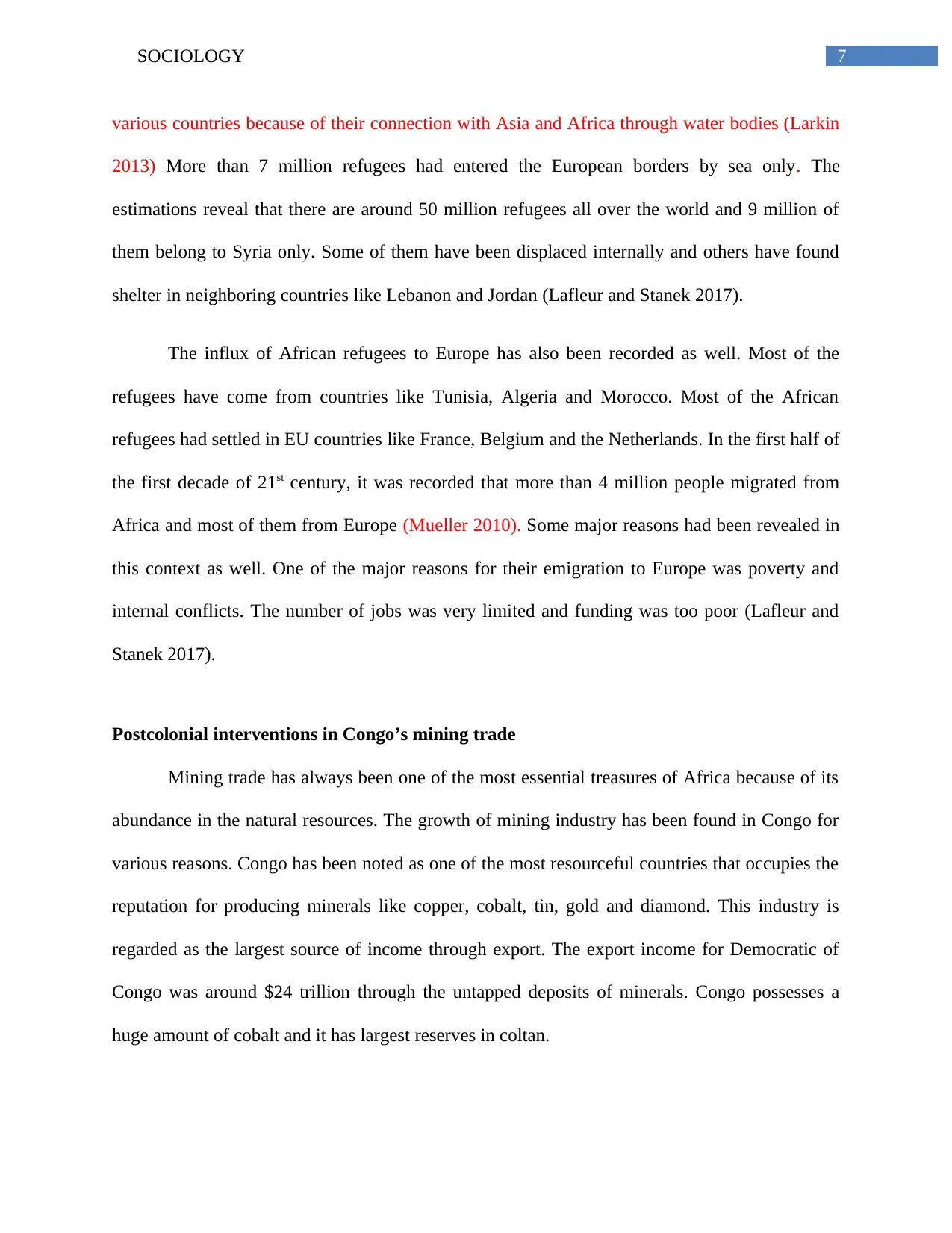
7SOCIOLOGY
various countries because of their connection with Asia and Africa through water bodies (Larkin
2013) More than 7 million refugees had entered the European borders by sea only. The
estimations reveal that there are around 50 million refugees all over the world and 9 million of
them belong to Syria only. Some of them have been displaced internally and others have found
shelter in neighboring countries like Lebanon and Jordan (Lafleur and Stanek 2017).
The influx of African refugees to Europe has also been recorded as well. Most of the
refugees have come from countries like Tunisia, Algeria and Morocco. Most of the African
refugees had settled in EU countries like France, Belgium and the Netherlands. In the first half of
the first decade of 21st century, it was recorded that more than 4 million people migrated from
Africa and most of them from Europe (Mueller 2010). Some major reasons had been revealed in
this context as well. One of the major reasons for their emigration to Europe was poverty and
internal conflicts. The number of jobs was very limited and funding was too poor (Lafleur and
Stanek 2017).
Postcolonial interventions in Congo’s mining trade
Mining trade has always been one of the most essential treasures of Africa because of its
abundance in the natural resources. The growth of mining industry has been found in Congo for
various reasons. Congo has been noted as one of the most resourceful countries that occupies the
reputation for producing minerals like copper, cobalt, tin, gold and diamond. This industry is
regarded as the largest source of income through export. The export income for Democratic of
Congo was around $24 trillion through the untapped deposits of minerals. Congo possesses a
huge amount of cobalt and it has largest reserves in coltan.
various countries because of their connection with Asia and Africa through water bodies (Larkin
2013) More than 7 million refugees had entered the European borders by sea only. The
estimations reveal that there are around 50 million refugees all over the world and 9 million of
them belong to Syria only. Some of them have been displaced internally and others have found
shelter in neighboring countries like Lebanon and Jordan (Lafleur and Stanek 2017).
The influx of African refugees to Europe has also been recorded as well. Most of the
refugees have come from countries like Tunisia, Algeria and Morocco. Most of the African
refugees had settled in EU countries like France, Belgium and the Netherlands. In the first half of
the first decade of 21st century, it was recorded that more than 4 million people migrated from
Africa and most of them from Europe (Mueller 2010). Some major reasons had been revealed in
this context as well. One of the major reasons for their emigration to Europe was poverty and
internal conflicts. The number of jobs was very limited and funding was too poor (Lafleur and
Stanek 2017).
Postcolonial interventions in Congo’s mining trade
Mining trade has always been one of the most essential treasures of Africa because of its
abundance in the natural resources. The growth of mining industry has been found in Congo for
various reasons. Congo has been noted as one of the most resourceful countries that occupies the
reputation for producing minerals like copper, cobalt, tin, gold and diamond. This industry is
regarded as the largest source of income through export. The export income for Democratic of
Congo was around $24 trillion through the untapped deposits of minerals. Congo possesses a
huge amount of cobalt and it has largest reserves in coltan.
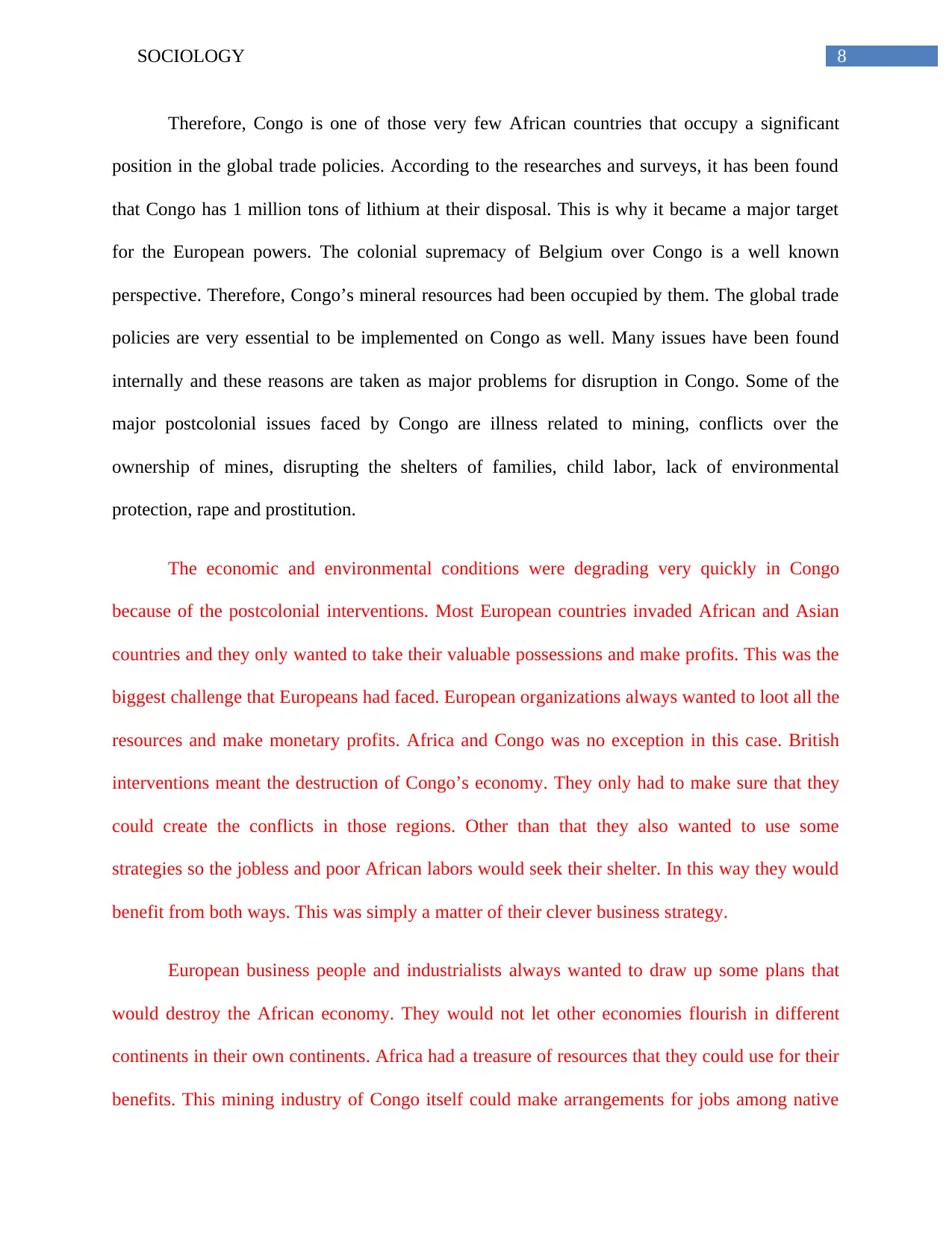
8SOCIOLOGY
Therefore, Congo is one of those very few African countries that occupy a significant
position in the global trade policies. According to the researches and surveys, it has been found
that Congo has 1 million tons of lithium at their disposal. This is why it became a major target
for the European powers. The colonial supremacy of Belgium over Congo is a well known
perspective. Therefore, Congo’s mineral resources had been occupied by them. The global trade
policies are very essential to be implemented on Congo as well. Many issues have been found
internally and these reasons are taken as major problems for disruption in Congo. Some of the
major postcolonial issues faced by Congo are illness related to mining, conflicts over the
ownership of mines, disrupting the shelters of families, child labor, lack of environmental
protection, rape and prostitution.
The economic and environmental conditions were degrading very quickly in Congo
because of the postcolonial interventions. Most European countries invaded African and Asian
countries and they only wanted to take their valuable possessions and make profits. This was the
biggest challenge that Europeans had faced. European organizations always wanted to loot all the
resources and make monetary profits. Africa and Congo was no exception in this case. British
interventions meant the destruction of Congo’s economy. They only had to make sure that they
could create the conflicts in those regions. Other than that they also wanted to use some
strategies so the jobless and poor African labors would seek their shelter. In this way they would
benefit from both ways. This was simply a matter of their clever business strategy.
European business people and industrialists always wanted to draw up some plans that
would destroy the African economy. They would not let other economies flourish in different
continents in their own continents. Africa had a treasure of resources that they could use for their
benefits. This mining industry of Congo itself could make arrangements for jobs among native
Therefore, Congo is one of those very few African countries that occupy a significant
position in the global trade policies. According to the researches and surveys, it has been found
that Congo has 1 million tons of lithium at their disposal. This is why it became a major target
for the European powers. The colonial supremacy of Belgium over Congo is a well known
perspective. Therefore, Congo’s mineral resources had been occupied by them. The global trade
policies are very essential to be implemented on Congo as well. Many issues have been found
internally and these reasons are taken as major problems for disruption in Congo. Some of the
major postcolonial issues faced by Congo are illness related to mining, conflicts over the
ownership of mines, disrupting the shelters of families, child labor, lack of environmental
protection, rape and prostitution.
The economic and environmental conditions were degrading very quickly in Congo
because of the postcolonial interventions. Most European countries invaded African and Asian
countries and they only wanted to take their valuable possessions and make profits. This was the
biggest challenge that Europeans had faced. European organizations always wanted to loot all the
resources and make monetary profits. Africa and Congo was no exception in this case. British
interventions meant the destruction of Congo’s economy. They only had to make sure that they
could create the conflicts in those regions. Other than that they also wanted to use some
strategies so the jobless and poor African labors would seek their shelter. In this way they would
benefit from both ways. This was simply a matter of their clever business strategy.
European business people and industrialists always wanted to draw up some plans that
would destroy the African economy. They would not let other economies flourish in different
continents in their own continents. Africa had a treasure of resources that they could use for their
benefits. This mining industry of Congo itself could make arrangements for jobs among native
⊘ This is a preview!⊘
Do you want full access?
Subscribe today to unlock all pages.

Trusted by 1+ million students worldwide
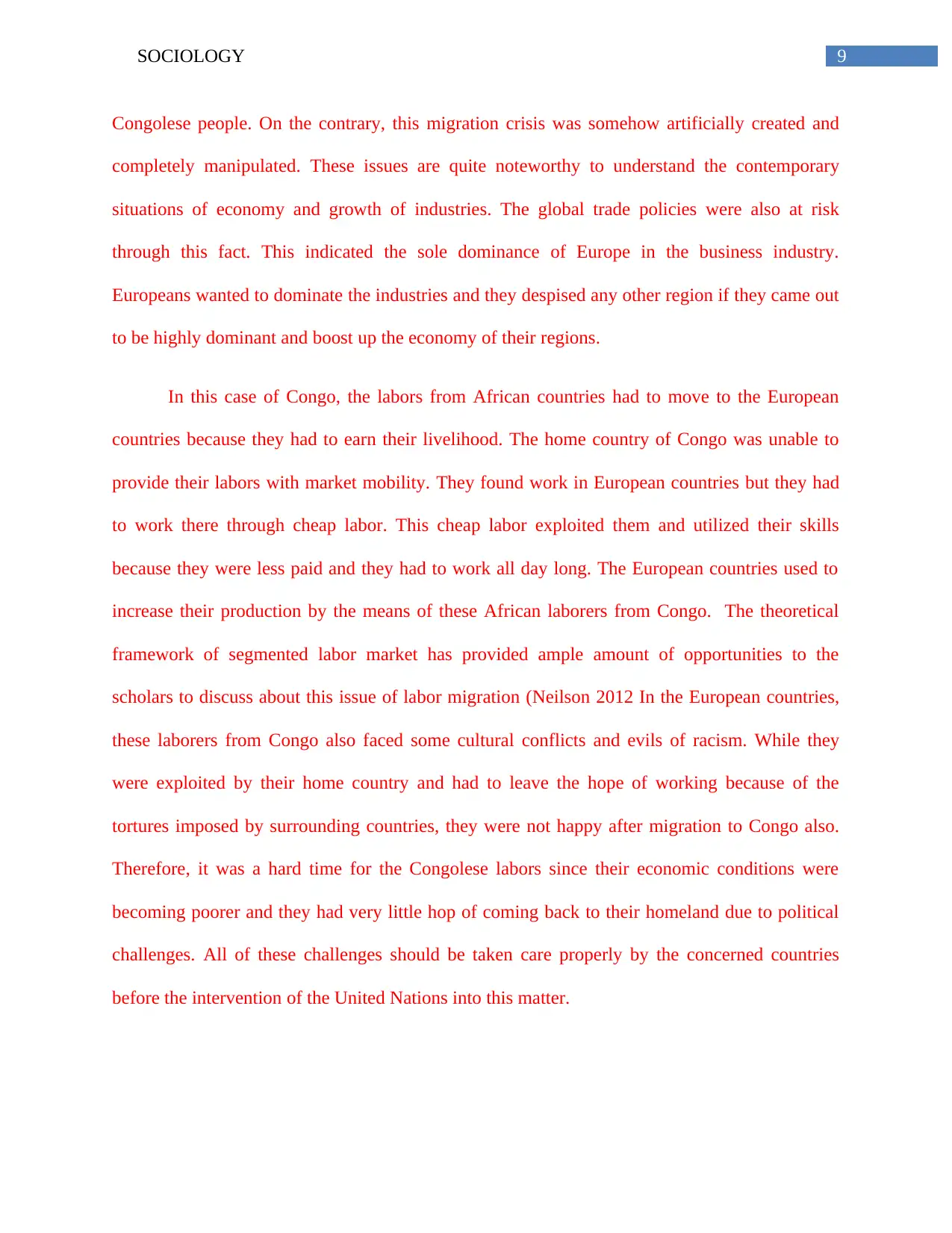
9SOCIOLOGY
Congolese people. On the contrary, this migration crisis was somehow artificially created and
completely manipulated. These issues are quite noteworthy to understand the contemporary
situations of economy and growth of industries. The global trade policies were also at risk
through this fact. This indicated the sole dominance of Europe in the business industry.
Europeans wanted to dominate the industries and they despised any other region if they came out
to be highly dominant and boost up the economy of their regions.
In this case of Congo, the labors from African countries had to move to the European
countries because they had to earn their livelihood. The home country of Congo was unable to
provide their labors with market mobility. They found work in European countries but they had
to work there through cheap labor. This cheap labor exploited them and utilized their skills
because they were less paid and they had to work all day long. The European countries used to
increase their production by the means of these African laborers from Congo. The theoretical
framework of segmented labor market has provided ample amount of opportunities to the
scholars to discuss about this issue of labor migration (Neilson 2012 In the European countries,
these laborers from Congo also faced some cultural conflicts and evils of racism. While they
were exploited by their home country and had to leave the hope of working because of the
tortures imposed by surrounding countries, they were not happy after migration to Congo also.
Therefore, it was a hard time for the Congolese labors since their economic conditions were
becoming poorer and they had very little hop of coming back to their homeland due to political
challenges. All of these challenges should be taken care properly by the concerned countries
before the intervention of the United Nations into this matter.
Congolese people. On the contrary, this migration crisis was somehow artificially created and
completely manipulated. These issues are quite noteworthy to understand the contemporary
situations of economy and growth of industries. The global trade policies were also at risk
through this fact. This indicated the sole dominance of Europe in the business industry.
Europeans wanted to dominate the industries and they despised any other region if they came out
to be highly dominant and boost up the economy of their regions.
In this case of Congo, the labors from African countries had to move to the European
countries because they had to earn their livelihood. The home country of Congo was unable to
provide their labors with market mobility. They found work in European countries but they had
to work there through cheap labor. This cheap labor exploited them and utilized their skills
because they were less paid and they had to work all day long. The European countries used to
increase their production by the means of these African laborers from Congo. The theoretical
framework of segmented labor market has provided ample amount of opportunities to the
scholars to discuss about this issue of labor migration (Neilson 2012 In the European countries,
these laborers from Congo also faced some cultural conflicts and evils of racism. While they
were exploited by their home country and had to leave the hope of working because of the
tortures imposed by surrounding countries, they were not happy after migration to Congo also.
Therefore, it was a hard time for the Congolese labors since their economic conditions were
becoming poorer and they had very little hop of coming back to their homeland due to political
challenges. All of these challenges should be taken care properly by the concerned countries
before the intervention of the United Nations into this matter.
Paraphrase This Document
Need a fresh take? Get an instant paraphrase of this document with our AI Paraphraser
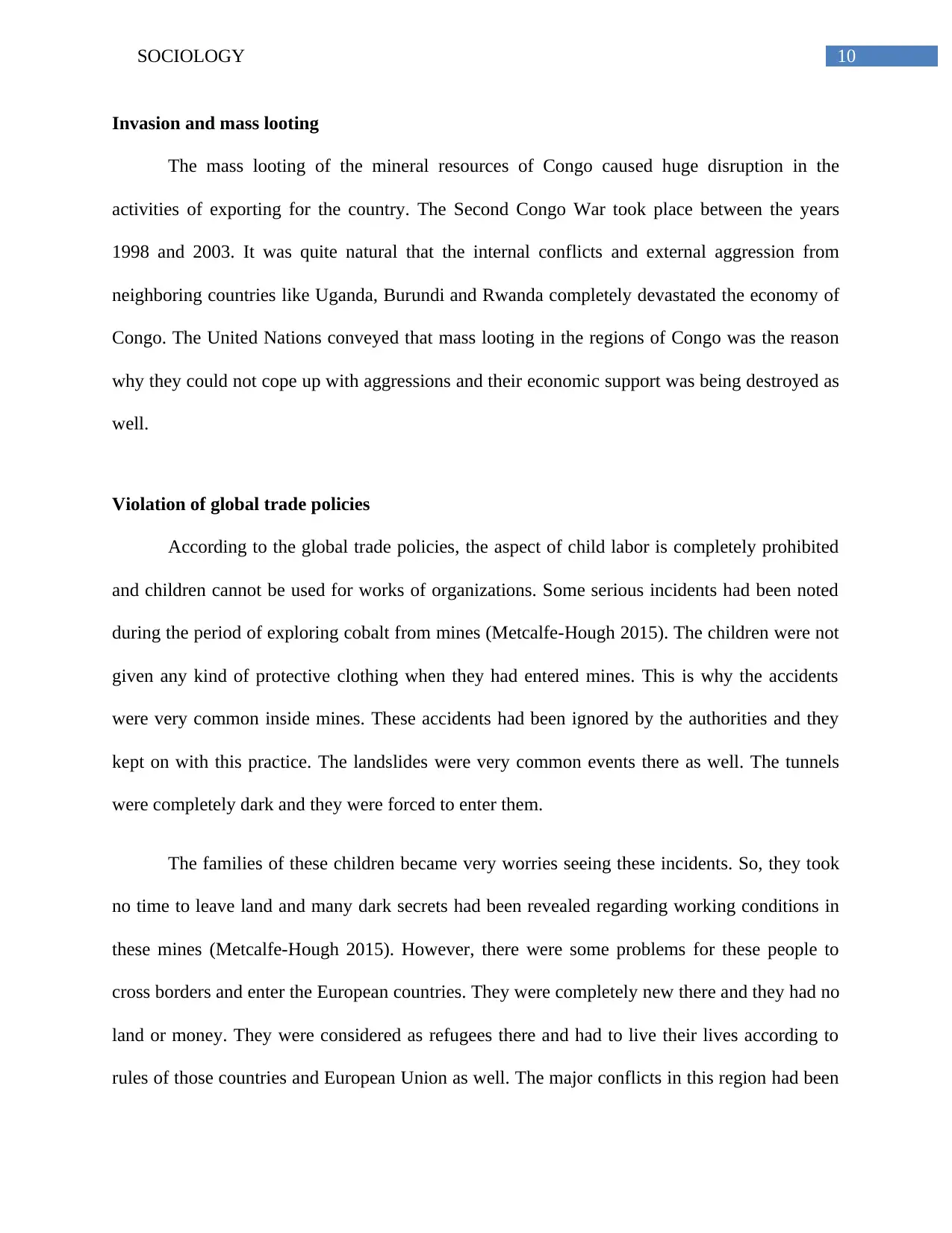
10SOCIOLOGY
Invasion and mass looting
The mass looting of the mineral resources of Congo caused huge disruption in the
activities of exporting for the country. The Second Congo War took place between the years
1998 and 2003. It was quite natural that the internal conflicts and external aggression from
neighboring countries like Uganda, Burundi and Rwanda completely devastated the economy of
Congo. The United Nations conveyed that mass looting in the regions of Congo was the reason
why they could not cope up with aggressions and their economic support was being destroyed as
well.
Violation of global trade policies
According to the global trade policies, the aspect of child labor is completely prohibited
and children cannot be used for works of organizations. Some serious incidents had been noted
during the period of exploring cobalt from mines (Metcalfe-Hough 2015). The children were not
given any kind of protective clothing when they had entered mines. This is why the accidents
were very common inside mines. These accidents had been ignored by the authorities and they
kept on with this practice. The landslides were very common events there as well. The tunnels
were completely dark and they were forced to enter them.
The families of these children became very worries seeing these incidents. So, they took
no time to leave land and many dark secrets had been revealed regarding working conditions in
these mines (Metcalfe-Hough 2015). However, there were some problems for these people to
cross borders and enter the European countries. They were completely new there and they had no
land or money. They were considered as refugees there and had to live their lives according to
rules of those countries and European Union as well. The major conflicts in this region had been
Invasion and mass looting
The mass looting of the mineral resources of Congo caused huge disruption in the
activities of exporting for the country. The Second Congo War took place between the years
1998 and 2003. It was quite natural that the internal conflicts and external aggression from
neighboring countries like Uganda, Burundi and Rwanda completely devastated the economy of
Congo. The United Nations conveyed that mass looting in the regions of Congo was the reason
why they could not cope up with aggressions and their economic support was being destroyed as
well.
Violation of global trade policies
According to the global trade policies, the aspect of child labor is completely prohibited
and children cannot be used for works of organizations. Some serious incidents had been noted
during the period of exploring cobalt from mines (Metcalfe-Hough 2015). The children were not
given any kind of protective clothing when they had entered mines. This is why the accidents
were very common inside mines. These accidents had been ignored by the authorities and they
kept on with this practice. The landslides were very common events there as well. The tunnels
were completely dark and they were forced to enter them.
The families of these children became very worries seeing these incidents. So, they took
no time to leave land and many dark secrets had been revealed regarding working conditions in
these mines (Metcalfe-Hough 2015). However, there were some problems for these people to
cross borders and enter the European countries. They were completely new there and they had no
land or money. They were considered as refugees there and had to live their lives according to
rules of those countries and European Union as well. The major conflicts in this region had been
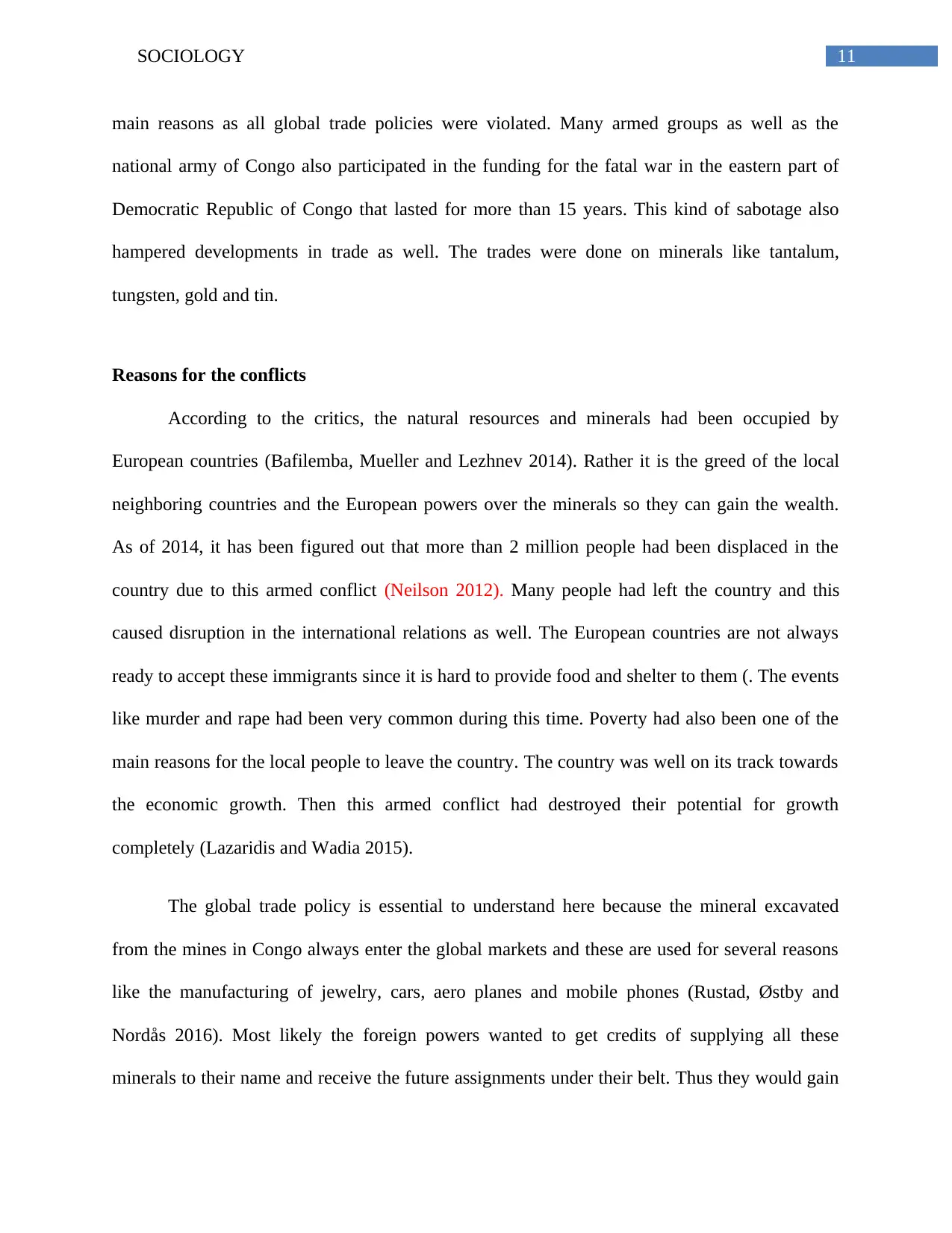
11SOCIOLOGY
main reasons as all global trade policies were violated. Many armed groups as well as the
national army of Congo also participated in the funding for the fatal war in the eastern part of
Democratic Republic of Congo that lasted for more than 15 years. This kind of sabotage also
hampered developments in trade as well. The trades were done on minerals like tantalum,
tungsten, gold and tin.
Reasons for the conflicts
According to the critics, the natural resources and minerals had been occupied by
European countries (Bafilemba, Mueller and Lezhnev 2014). Rather it is the greed of the local
neighboring countries and the European powers over the minerals so they can gain the wealth.
As of 2014, it has been figured out that more than 2 million people had been displaced in the
country due to this armed conflict (Neilson 2012). Many people had left the country and this
caused disruption in the international relations as well. The European countries are not always
ready to accept these immigrants since it is hard to provide food and shelter to them (. The events
like murder and rape had been very common during this time. Poverty had also been one of the
main reasons for the local people to leave the country. The country was well on its track towards
the economic growth. Then this armed conflict had destroyed their potential for growth
completely (Lazaridis and Wadia 2015).
The global trade policy is essential to understand here because the mineral excavated
from the mines in Congo always enter the global markets and these are used for several reasons
like the manufacturing of jewelry, cars, aero planes and mobile phones (Rustad, Østby and
Nordås 2016). Most likely the foreign powers wanted to get credits of supplying all these
minerals to their name and receive the future assignments under their belt. Thus they would gain
main reasons as all global trade policies were violated. Many armed groups as well as the
national army of Congo also participated in the funding for the fatal war in the eastern part of
Democratic Republic of Congo that lasted for more than 15 years. This kind of sabotage also
hampered developments in trade as well. The trades were done on minerals like tantalum,
tungsten, gold and tin.
Reasons for the conflicts
According to the critics, the natural resources and minerals had been occupied by
European countries (Bafilemba, Mueller and Lezhnev 2014). Rather it is the greed of the local
neighboring countries and the European powers over the minerals so they can gain the wealth.
As of 2014, it has been figured out that more than 2 million people had been displaced in the
country due to this armed conflict (Neilson 2012). Many people had left the country and this
caused disruption in the international relations as well. The European countries are not always
ready to accept these immigrants since it is hard to provide food and shelter to them (. The events
like murder and rape had been very common during this time. Poverty had also been one of the
main reasons for the local people to leave the country. The country was well on its track towards
the economic growth. Then this armed conflict had destroyed their potential for growth
completely (Lazaridis and Wadia 2015).
The global trade policy is essential to understand here because the mineral excavated
from the mines in Congo always enter the global markets and these are used for several reasons
like the manufacturing of jewelry, cars, aero planes and mobile phones (Rustad, Østby and
Nordås 2016). Most likely the foreign powers wanted to get credits of supplying all these
minerals to their name and receive the future assignments under their belt. Thus they would gain
⊘ This is a preview!⊘
Do you want full access?
Subscribe today to unlock all pages.

Trusted by 1+ million students worldwide
1 out of 20
Related Documents
Your All-in-One AI-Powered Toolkit for Academic Success.
+13062052269
info@desklib.com
Available 24*7 on WhatsApp / Email
![[object Object]](/_next/static/media/star-bottom.7253800d.svg)
Unlock your academic potential
Copyright © 2020–2026 A2Z Services. All Rights Reserved. Developed and managed by ZUCOL.




